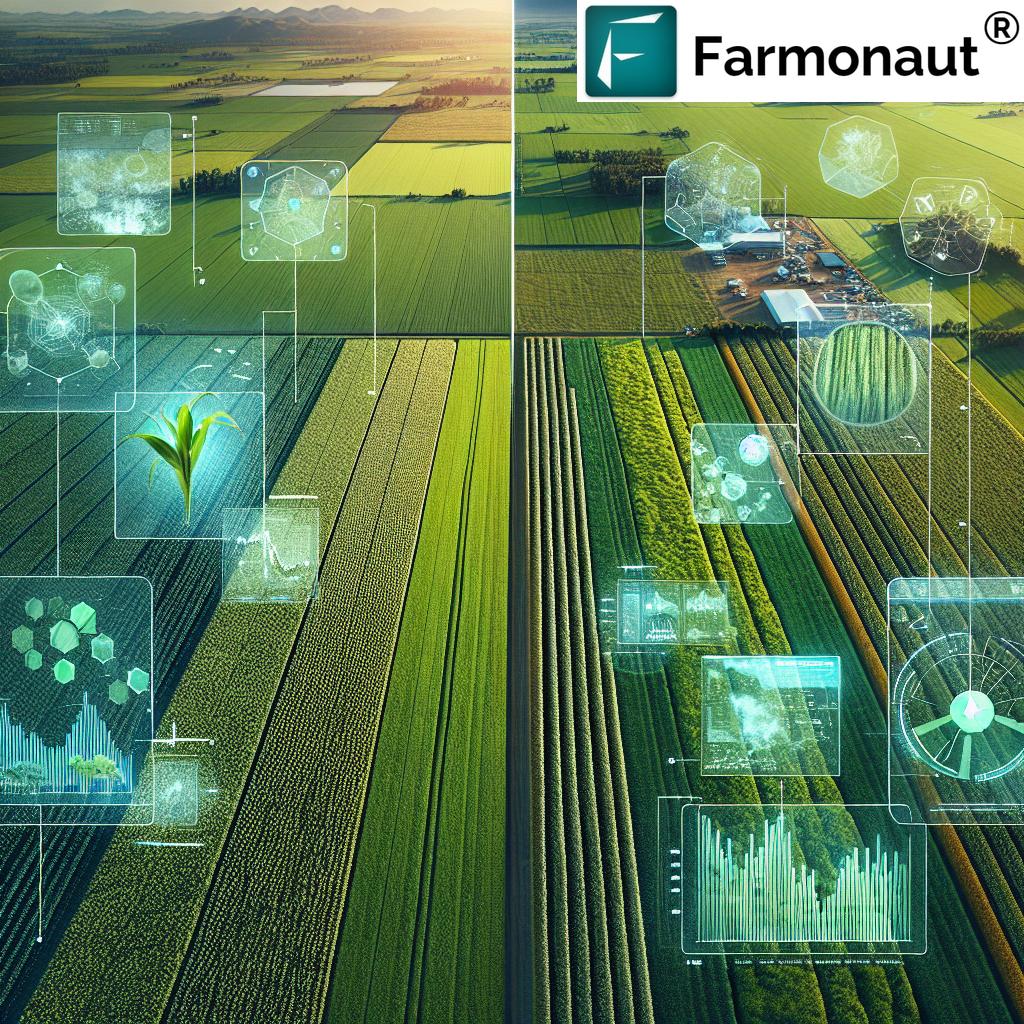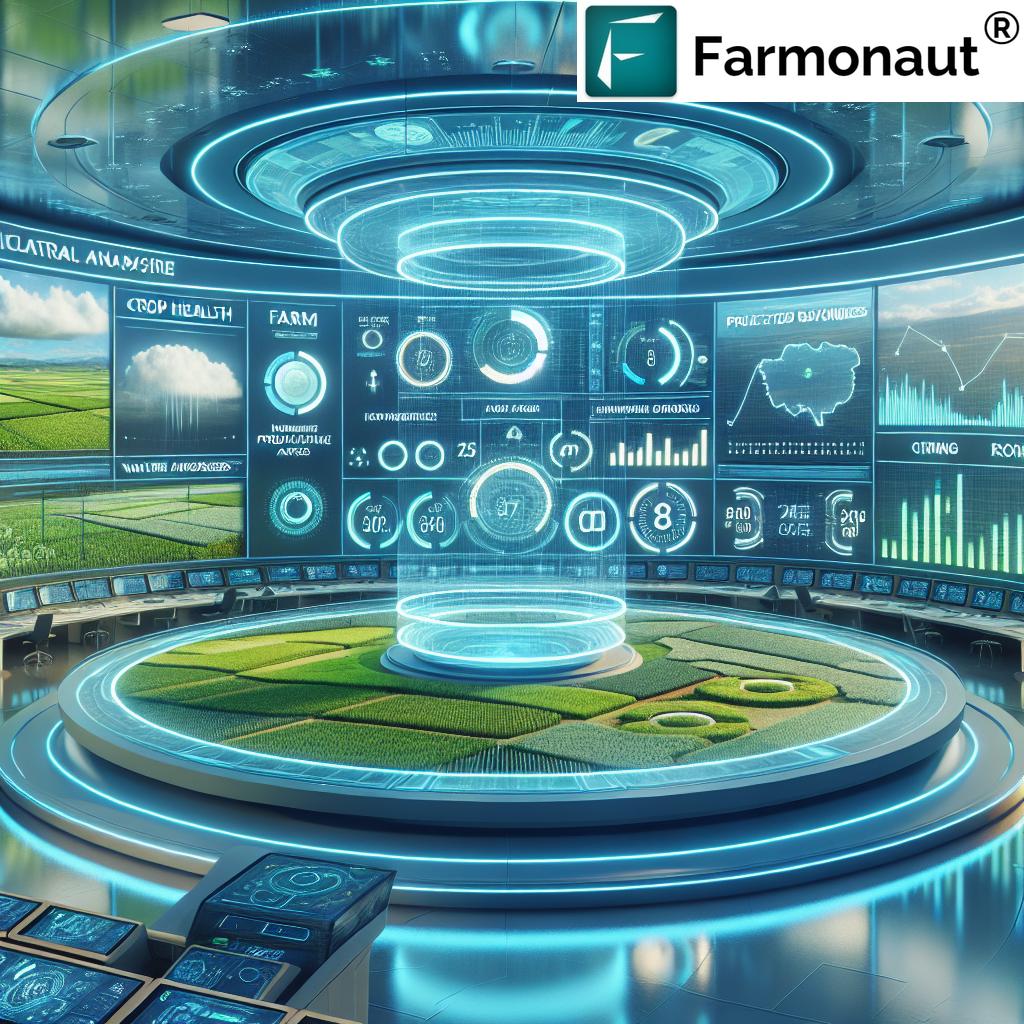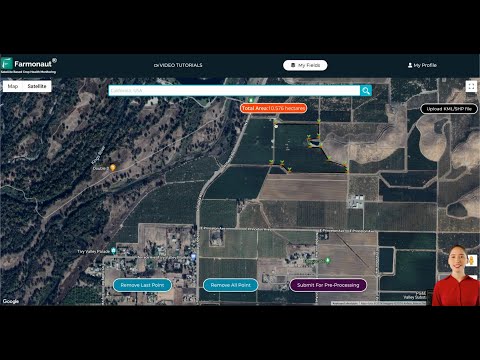Revolutionizing Agriculture: How Farmonaut’s Precision Technology Boosts Crop Yields and Sustainability
“Farmonaut’s precision agriculture technology has been shown to increase crop yields by up to 25% in some cases.”
In the ever-evolving landscape of modern agriculture, we at Farmonaut are at the forefront of a technological revolution that is reshaping the way we approach farming. As we delve into the intricate world of precision agriculture technology and satellite crop monitoring, we’re excited to share how these innovations are not just changing the game but completely redefining it.
The Dawn of a New Agricultural Era
The agricultural sector has come a long way from traditional farming methods. Today, we’re witnessing a paradigm shift towards smart farming solutions and agricultural data analytics. This shift is not just a trend; it’s a necessity in the face of growing global food demand, climate change, and the need for sustainable farming practices.
At Farmonaut, we’ve embraced this change wholeheartedly. Our platform leverages cutting-edge technologies to provide farmers with the tools they need to optimize crop yields, conserve resources, and make data-driven decisions. But what exactly does this mean for the future of farming? Let’s explore.
The Power of Precision Agriculture Technology
Precision agriculture is all about doing more with less. It’s about using technology to make farming more accurate and controlled when it comes to growing crops and raising livestock. At its core, precision agriculture relies on four key components:
- Remote sensing
- Satellite positioning systems (GPS)
- Variable rate technology (VRT)
- Advanced software and analytics
These components work together to provide farmers with a level of insight and control that was previously unimaginable. Let’s break down how each of these elements contributes to the precision agriculture revolution.
Remote Sensing: The Eyes in the Sky
Remote sensing in agriculture involves collecting data about crops and soil without physical contact. This is typically done using satellite imagery or drones equipped with specialized cameras. At Farmonaut, we’ve harnessed the power of satellite crop monitoring to provide our users with real-time insights into their fields.
Our satellite-based crop health monitoring system uses multispectral imagery to assess various aspects of crop health, including:
- Vegetation health (NDVI)
- Soil moisture levels
- Pest and disease detection
- Nutrient deficiencies
This information is invaluable for farmers, allowing them to identify issues early and take targeted action to address them.

GPS: Pinpoint Accuracy in the Field
Global Positioning System (GPS) technology has revolutionized the way farmers navigate and manage their fields. With GPS, farmers can:
- Create precise field maps
- Implement variable rate applications of seeds, fertilizers, and pesticides
- Guide machinery with centimeter-level accuracy
- Track and optimize field operations
Our digital farm management tools integrate GPS data to provide farmers with a comprehensive view of their operations, enabling them to make informed decisions about resource allocation and field management.
Variable Rate Technology: Precision in Action
Variable Rate Technology (VRT) allows farmers to apply inputs like water, fertilizer, and pesticides at varying rates across a field, depending on the specific needs of each area. This level of precision ensures that resources are used efficiently, reducing waste and environmental impact while optimizing crop growth.
Farmonaut’s platform incorporates VRT capabilities, allowing farmers to create prescription maps for their fields based on the data collected through remote sensing and other sources. This enables highly targeted and efficient resource management, leading to improved yields and reduced input costs.
Advanced Software and Analytics: Turning Data into Insights
The true power of precision agriculture lies in the ability to analyze and interpret the vast amounts of data collected. This is where AI in agriculture and machine learning algorithms come into play. Our Jeevn AI Advisory System is at the heart of this process, providing farmers with:
- Real-time insights into crop health and field conditions
- Predictive analytics for yield forecasting
- Personalized recommendations for crop management
- Weather forecasts and pest/disease alerts
By leveraging these advanced analytics capabilities, farmers can make proactive decisions that drive sustainable farming practices and improve overall productivity.
“Satellite crop monitoring can reduce water usage in agriculture by up to 30%, promoting more sustainable farming practices.”
The Impact of Precision Agriculture on Crop Yields and Sustainability
The adoption of precision agriculture technology has led to significant improvements in both crop yields and sustainability. Let’s take a closer look at how these technologies are making a difference.
Boosting Crop Yields
Precision agriculture has been shown to increase crop yields through:
- Optimized planting density and timing
- Targeted application of inputs
- Early detection and management of crop stress
- Improved soil health management
Our clients have reported yield increases of up to 25% in some cases, demonstrating the powerful impact of data-driven farming practices.
Enhancing Sustainability
Sustainability is a key focus of precision agriculture. By optimizing resource use, these technologies help to:
- Reduce water consumption
- Minimize chemical runoff
- Lower greenhouse gas emissions
- Improve soil health and biodiversity
Farmonaut’s carbon footprinting feature allows agribusinesses to track and reduce their environmental impact, supporting the transition to more sustainable farming practices.
Farmonaut’s Innovative Solutions
At Farmonaut, we’ve developed a comprehensive suite of tools designed to empower farmers and agribusinesses with the latest in precision agriculture technology. Our platform includes:
- Satellite-based crop health monitoring
- Jeevn AI Advisory System
- Blockchain-based product traceability
- Fleet and resource management tools
- Carbon footprinting capabilities
These solutions are accessible through our user-friendly web and mobile apps, making it easy for farmers to leverage advanced technologies regardless of their technical expertise.
Ready to experience the power of precision agriculture? Try Farmonaut today!
The Role of AI in Agriculture
Artificial Intelligence (AI) is playing an increasingly important role in modern agriculture. At Farmonaut, we’ve integrated AI into various aspects of our platform to provide farmers with unparalleled insights and decision-making support.
AI-Powered Crop Health Analysis
Our AI algorithms analyze satellite imagery to detect early signs of crop stress, disease, or nutrient deficiencies. This allows farmers to take proactive measures to address issues before they become serious problems, potentially saving entire harvests.
Predictive Yield Forecasting
By combining historical data, current field conditions, and weather forecasts, our AI models can provide accurate yield predictions. This information is invaluable for financial planning, resource allocation, and supply chain management.
Personalized Crop Management Recommendations
The Jeevn AI Advisory System takes into account a wide range of factors to provide tailored recommendations for each field. This includes optimal planting and harvesting times, irrigation schedules, and fertilizer applications.

The Future of Farming: Integrating Technologies
As we look to the future, the integration of various technologies will continue to drive innovation in agriculture. Some key areas of development include:
Internet of Things (IoT) in Agriculture
IoT devices, such as soil sensors and weather stations, provide real-time data that can be integrated with satellite imagery to create a comprehensive view of field conditions. This level of detail allows for even more precise management of resources and crop health.
Blockchain for Supply Chain Transparency
Our blockchain-based traceability solutions are just the beginning. As blockchain technology evolves, we anticipate even greater transparency and efficiency in agricultural supply chains, benefiting both producers and consumers.
Advanced Robotics and Automation
While not currently part of our offerings, we’re closely monitoring developments in agricultural robotics. Autonomous tractors, drones, and harvesting robots have the potential to revolutionize farm labor and efficiency.
Overcoming Challenges in Precision Agriculture
While the benefits of precision agriculture are clear, there are still challenges to widespread adoption. At Farmonaut, we’re committed to addressing these challenges head-on:
Cost Barriers
Traditional precision agriculture tools can be expensive, putting them out of reach for many small and medium-sized farms. Our satellite-based approach significantly reduces the need for costly on-site hardware, making precision agriculture more accessible to a wider range of farmers.
Data Management and Interpretation
The sheer volume of data generated by precision agriculture technologies can be overwhelming. Our user-friendly interface and AI-powered analytics simplify data interpretation, allowing farmers to focus on action rather than analysis.
Connectivity Issues
Many rural areas still lack reliable internet connectivity, which can hinder the adoption of digital farming tools. Farmonaut’s platform is designed to work with intermittent connectivity, ensuring that farmers can access critical information even in areas with limited internet access.
The Economic Impact of Precision Agriculture
The adoption of precision agriculture technologies has significant economic implications for farmers and the broader agricultural industry:
Improved Profitability
By optimizing resource use and increasing yields, precision agriculture can lead to substantial improvements in farm profitability. Our clients have reported reductions in input costs of up to 20% while simultaneously increasing yields.
Risk Mitigation
The early detection of crop stress and precise weather forecasting help farmers mitigate risks associated with pests, diseases, and adverse weather conditions. This can lead to more stable incomes and reduced crop insurance claims.
New Revenue Streams
Precision agriculture data can open up new revenue opportunities for farmers. For example, carbon credit markets are emerging that allow farmers to monetize sustainable practices that sequester carbon in the soil.
Precision Agriculture Technology Comparison
| Technology Type | Crop Yield Improvement (%) | Water Conservation (%) | Fertilizer Reduction (%) | Real-time Monitoring Capability | AI-powered Analytics |
|---|---|---|---|---|---|
| Satellite Crop Monitoring (Farmonaut) | 20-25 | 25-30 | 15-20 | Yes | Advanced |
| Agricultural Drones | 10-15 | 15-20 | 10-15 | Yes | Moderate |
| IoT Sensors | 5-10 | 20-25 | 10-15 | Yes | Basic |
| Traditional Farming Methods | 0-5 | 0-5 | 0-5 | No | None |
As the table demonstrates, Farmonaut’s satellite crop monitoring technology offers superior performance across key indicators, highlighting the significant advantages of our precision agriculture solutions.
Sustainable Farming Practices Enabled by Precision Agriculture
Precision agriculture is not just about increasing yields; it’s also about promoting sustainable farming practices that protect the environment and ensure long-term food security. Some of the key sustainable practices enabled by precision agriculture include:
Reduced Chemical Usage
By allowing for targeted application of pesticides and herbicides, precision agriculture significantly reduces the overall chemical load on the environment. This not only saves farmers money but also protects biodiversity and water quality.
Water Conservation
Precision irrigation systems, informed by satellite data and soil moisture sensors, can reduce water usage by up to 30%. This is particularly crucial in water-stressed regions where every drop counts.
Soil Health Management
Our platform provides insights into soil health, allowing farmers to implement practices that improve soil structure, increase organic matter content, and enhance microbial activity. This not only boosts crop yields but also increases the soil’s carbon sequestration potential.
The Global Impact of Precision Agriculture
As precision agriculture technologies like those offered by Farmonaut continue to evolve and become more accessible, their impact is being felt on a global scale:
Food Security
By increasing yields and reducing crop losses, precision agriculture is playing a crucial role in ensuring global food security. This is particularly important as we face the challenges of a growing world population and climate change.
Climate Change Mitigation
The agricultural sector is a significant contributor to greenhouse gas emissions. Precision agriculture helps reduce these emissions through more efficient resource use and by enabling practices that sequester carbon in the soil.
Rural Development
By improving farm profitability and creating new high-tech job opportunities in rural areas, precision agriculture is contributing to the revitalization of rural economies around the world.
Farmonaut: Your Partner in Precision Agriculture
At Farmonaut, we’re committed to making precision agriculture accessible to farmers of all sizes. Our platform offers:
- Easy-to-use web and mobile apps
- Affordable subscription plans
- Comprehensive training and support
- Continuous innovation and feature updates
Whether you’re a small family farm or a large agribusiness, we have solutions tailored to your needs. Our API access also allows for seamless integration with existing farm management systems, making it easy to incorporate our powerful tools into your current workflows.
Interested in leveraging our API for your agricultural projects? Check out our API Developer Docs or visit our API page for more information.
Conclusion: Embracing the Future of Agriculture
As we look to the future, it’s clear that precision agriculture will play an increasingly important role in feeding the world sustainably. At Farmonaut, we’re proud to be at the forefront of this agricultural revolution, providing farmers with the tools they need to boost crop yields, improve sustainability, and thrive in an ever-changing industry.
By embracing precision agriculture technologies, farmers can:
- Increase yields and profitability
- Reduce environmental impact
- Adapt to changing climate conditions
- Contribute to global food security
We invite you to join us on this journey towards a more sustainable and productive agricultural future. Explore our platform, try our tools, and experience the power of precision agriculture for yourself.
Frequently Asked Questions (FAQ)
1. What is precision agriculture?
Precision agriculture is an approach to farm management that uses information technology and specialized equipment to optimize crop production. It involves collecting and analyzing data about variability in fields to make more precise decisions about planting, fertilizing, and harvesting crops.
2. How does Farmonaut’s satellite crop monitoring work?
Farmonaut uses multispectral satellite imagery to analyze crop health, soil moisture, and other field conditions. Our AI algorithms process this data to provide actionable insights to farmers, such as early detection of crop stress or recommendations for resource application.
3. Can small farms benefit from precision agriculture?
Absolutely! Farmonaut’s platform is designed to be accessible and affordable for farms of all sizes. Our satellite-based approach eliminates the need for expensive on-site hardware, making precision agriculture viable for small and medium-sized farms.
4. How does precision agriculture contribute to sustainability?
Precision agriculture promotes sustainability by optimizing resource use, reducing chemical inputs, conserving water, and improving soil health. This leads to reduced environmental impact and long-term viability of farming operations.
5. What kind of return on investment can I expect from implementing precision agriculture?
While results can vary, many farmers report significant ROI from precision agriculture. This can come in the form of increased yields (up to 25% in some cases), reduced input costs (15-20% savings on fertilizer and pesticides), and improved overall farm efficiency.






